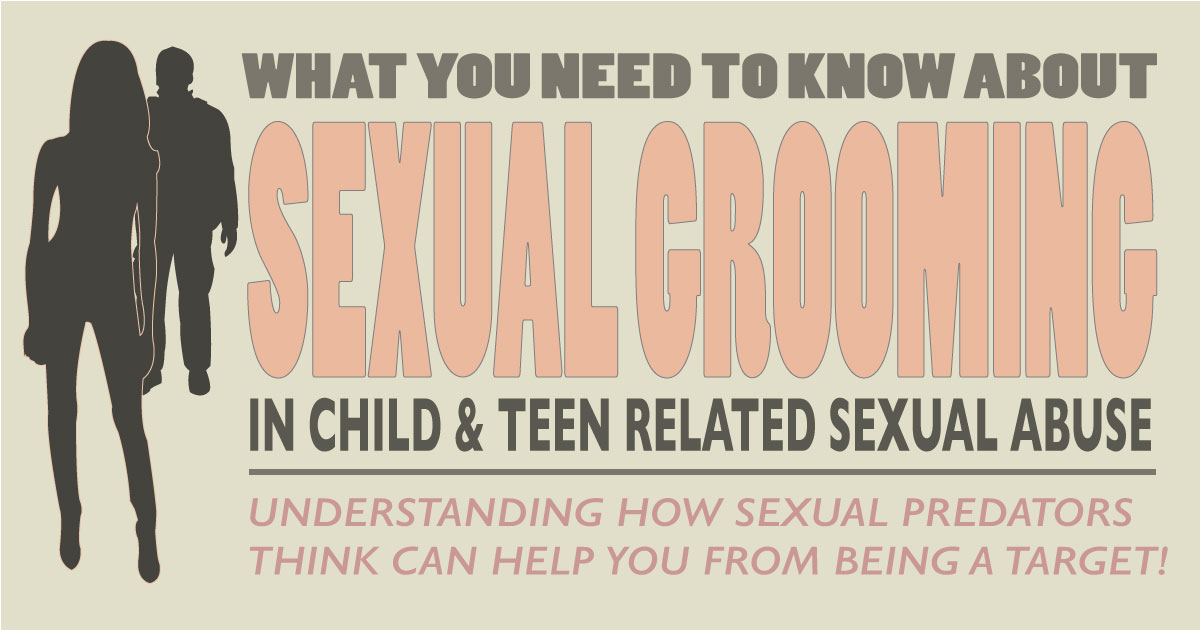What Is Sexual Grooming?

The 7 Stages of Sexual Grooming
As a California Child Sexual Abuse Attorney, we use the term “Sexual Grooming” in our posts and court complaints pretty often. Sexual Grooming is a dynamic that sexual predators use to manipulate their victims. But what exactly is Sexual Grooming? In the following article, we do our best to describe the seven distinct stages of the Sexual Grooming process. We also try to provide examples of the types of behaviors one might see in each stage of the process. It’s important to note that Sexual Grooming is a dynamic process. Therefore the lines that distinguish each of the stages are not always the same in every case.
The term “Sexual Grooming” is defined by various survivor advocacy organizations as well as by researchers specializing in child sexual abuse. More information about Sexual Grooming is available through the National Center for Victims of Crime and RAINN.org.
LEARN MORE about how sexual grooming applies to California Child Molestation Law>>
Stage 1. Identifying the Best Possible Target
Sexual perpetrators identify and select their young targets based on their own sexual desires in addition to a perceived guarantee for success in pursuing sexual contact with the child/teen. Students, athletes, interns, volunteers, and members of youth organizations are common targets because circumstances such as these provide a safer environment for the predators to act. Sexual predators will carefully select their targets. Always making sure to chose those who present the highest potential for success with the lowest potential for exposure. It is also important for predators to chose targets who they are confident that they can successfully groom.
Stage 2. Gaining Trust and Access to the Target
Sexual predators will often seek out professional careers and volunteer positions that place them in a role as a trusted adult. Teachers, coaches, priests, and youth mentors maintain a role of authority that minors are taught to respect. In these types of roles, predators will attempt to establish themselves as a unique resource to the child or teen. Sometimes they will frame the child’s parents as adversaries so that the child grows to “need” the perpetrator during common parent/child disagreements. In some cases, the sexual predator adopts a child-like demeanor to develop rapport and comfort with a group of children or teens.
Teens are particularly at risk in this stage. Because teenage years are a pivotal time in emotional development, they are susceptible to misunderstanding the intentions of sexual predators. Sexual predators will appear as adult “friends” in contrast to parents who seem controlling and unfair.
Stage 3. Playing a Role in their Victim’s Life
The perpetrator will often seduce the child into thinking that he/she understands the child in ways that no one else does. They fill a void in the child/teen’s life and make the child feel special. The perpetrator gives the child the type of attention that they believe the child is missing. By doing this, they develop deeper levels of trust and secrecy.
In this stage the perpetrator begins to play the role of a close friend, boyfriend, or girlfriend to their child victim. The child/teen begins to value the perpetrator as someone they are emotionally close to. This is a particularly dangerous stage for teens, as teens will begin to lie to their parents in an effort to spend more time communicating with the perpetrator. The perpetrator will also play a role that is different from their victim’s friends to establish a unique position as a “confidant.”
Stage 4. Gradually Isolating the Target and Newfound Relationship
Once a secure level of trust is developed and the child feels a “need” for the perpetrator’s relationship, the sexual perpetrator will begin to isolate the child/teen. Through different levels of isolation, the perpetrator prepares the child to begin initiating sexual contact. This may take the form of car rides, walks, or “dates.” Sexually suggestive talk on social media and in text messages may also occur in this stage.
Today, cellphones and social media are becoming the primary forms of communication during this stage. Children and teens are becoming increasingly comfortable with these types of communication. Text messaging, in particular, establishes a deeply personal and private channel of communication. This helps the perpetrator set the stage for future intimacy.
Stage 5. Creating a Secret Relationship
In this stage the sexual perpetrator projects an illusion of responsibility onto their victim by explaining how important it is for the victim to keep the forbidden relationship a secret. They trick their young victim into thinking that other adults “won’t understand” their unique connection. The perpetrator will often scare the child/teen into thinking that any disclosure or changes by the victim will result in bad circumstances.
Teens, especially, tend to seek privacy from their parents and families. In educational settings, we find that this is the stage where teens begin to believe that they “want” a relationship with their perpetrator. The grooming that occurs in this stage can be devastating to teens and can lead to suppressed emotions later in their adult lives.
]LEARN MORE about how teachers become sexually involved with their students >>
Stage 6. Initiating Sexual Contact
Once the perpetrator feels certain that the child/teen is “on their side” and that a successful, intimate, and private “relationship” has been secured, he/she will initiate sexual contact with the child. The contact may seem insignificant at first–casual touching, hugging, petting, and kissing are common. Sometimes the perpetrator will show pornography to their victim to initiate sexual arousal and to advance sexual contact.
Stage 7. Controlling the Relationship
At all stages of the grooming process, the sexual predator knows that what he/she is doing is wrong. So once sexual contact is successfully achieved, they will become more aggressive at ensuring that their victim will maintain secrecy. They will try to appear that they are protecting their victim’s interests. The perpetrators will often give gifts to keep their victim happy. Though, in the case of teachers, the perpetrator may threaten their victim with bad grades to maintain a position of control.
Sexual Grooming and You
If you suspect that you or someone you know are being sexually groomed by a trusted adult, you should take action now. Protect yourself and those who are vulnerable to sexual abuse as soon as possible. You can contact your local authorities or an expert child sexual abuse attorney with concerns you might have.

Anthony DeMarco is a California child and teen sexual abuse attorney in Pasadena, CA. He has practiced childhood sexual abuse law since 2002 and has been instrumental in exposing sexual abuse scandals in large organizations such as the Catholic Church, School Districts, Youth Sports, Police Departments, and Youth Organizations.




